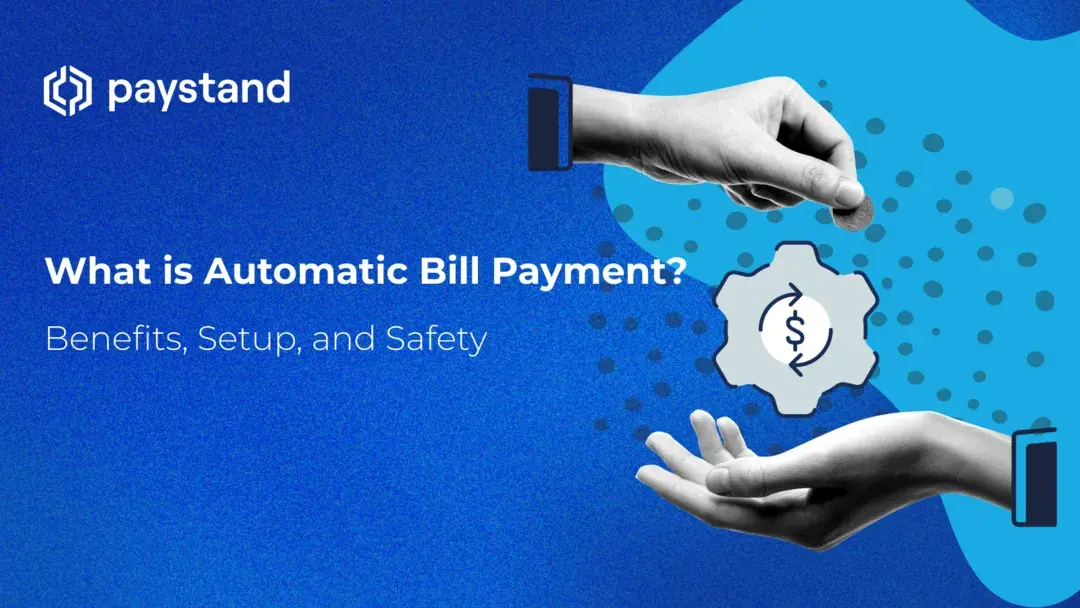What is Automatic Bill Payment? Benefits, Setup, and Safety

Table of Contents
- What is an automatic bill payment?
- How does automated billing work?
- How do I set up automatic bill payments?
- Are automatic bill payments safe?
- Automatic Bill Payment or Auto-Pay?
- Paystand: your AR automation solution
Key Takeaways
- Automatic bill payment allows customers to conveniently schedule recurring payments through their bank, ensuring bills are paid on time and avoiding the hassle of manual tracking.
- Setting up automatic bill payments involves choosing a payment date, authorizing the bank, and relying on the institution to withdraw and pay your bills automatically.
- While automatic bill payments are safe, users should monitor their accounts regularly to remain vigilant about overdraft fees, late fees, and potential fraud.
Tired of missing bill payments or spending too much time managing your business’ finances? Automatic bill payments might be the perfect solution for you. This hassle-free service allows you to schedule payments and have them processed on time—every time—without lifting a finger. If you’re looking to optimize your business’ digital payments setup, understanding the ins and outs of automatic billing can save you time, money, and headaches.
Ready to take control of your B2B payments routine? Dive into this guide to learn how automatic bill payments can streamline your life, and discover the best ways to make the most of this modern convenience.
What is an Automatic Bill Payment?
An automatic bill payment is a convenient and efficient way to pay your bills on time, every time. With automatic bill payment, you authorize your bank or financial institution to automatically withdraw funds from your checking or savings account and send them to your billers on the due date. This eliminates the need to write checks, mail payments, or remember to pay your bills on time.
There are many benefits to using automatic bill payment. These benefits include:
- Convenience: Automatic bill payment is a convenient way to pay your bills without writing checks or remembering to mail payments.
- Time-saving: Automatic bill payment can save you time by eliminating the need to track your bills and make payments.
- Reliability: Automatic bill payment ensures that your bills are paid on time, every time. This can help you avoid late fees and damage to your credit score.
- Security: Automatic bill payment is a secure way to pay your bills. Your bank or financial institution protects your financial information.
How Does Automated Billing Work?
Automated billing is a process by which businesses use software to generate and send invoices to their customers electronically. This technology streamlines the billing process, making it more efficient and accurate. Here's how automated billing works:
- Data integration: Automated billing systems integrate with business systems, pulling relevant data like customer information, product details, and pricing.
- Invoice creation: The automated billing system generates invoices based on the integrated data. These invoices can include the company's logo, branding, and other relevant information.
- Payment processing: They integrate with payment gateways for online payments through credit cards, debit cards, or e-wallets.
- Invoice delivery: Once an invoice is generated, the automated billing system sends it to the customer's email address or through a secure online portal.
- Payment reminders: Automated billing systems can automatically send reminders via email or text message to customers who have not yet paid their invoices.
- Reconciliation: Automated billing systems streamline accounting by tracking payments and reconciling them with invoices, minimizing manual errors.
How Do I Set Up an Automatic Bill Payments?
-
Set up your account: Contact your bank or financial institution and provide them with the information for the bills you want to pay automatically. This includes the biller's name, account number, and the amount of your monthly payment.
-
Choose your payment date: You can choose the date you want your bills to be paid. This can be the due date, a few days before, or any other date that works for you.
-
Authorize the payments: Once you've set up your account and chosen your payment date, you must authorize the payments. This can be done online, by phone, or at your bank or financial institution.
-
Your bills will be paid automatically: On the payment date, your bank or financial institution will automatically withdraw the funds from your checking or savings account and send them to your billers. You'll receive a confirmation email or statement showing your paid bills.
What Are Two Ways to Automate Bill Paying?
- Online Banking: Banks and financial institutions offer online banking services for automatic bill pay. You can schedule payments for recurring bills and specify amounts, due dates, and withdrawal accounts. Online banking also provides finance management tools like bill reminders and budget tracking.
- Bill Pay Services: These allow you to automate bill payments from a single platform, offering features like payment scheduling, reminders, and spending insights.
Are Automatic Bill Payments Safe?
Automatic bill payments are a convenient way to manage your finances and ensure your bills are paid on time. However, there are some potential risks to consider before setting up automatic bill payments, including:
- Overdraft fees: If you don't have enough money in your checking account to cover an automatic bill payment, you may be charged an overdraft fee.
- Late fees: If your bank or credit card company doesn't process your payment on time, your biller may charge you a late fee.
- Fraud: If your financial information is stolen, someone could use it to set up automatic bill payments in your name.
However, there are several things you can do to protect yourself when using automatic bill payments, such as:
- Only authorize automatic payments for bills that you trust.
- Keep track of your automatic bill payments to know when they will be paid.
- Ensure you have enough money in your checking account to cover your automatic bill payments.
- Review your bank statements regularly to look for any unauthorized activity.
Automatic Bill Payment or Auto-Pay?
Automatic Bill Payment and Auto-Pay are convenient services offered by banks and financial institutions that allow customers to make payments automatically from their checking or savings accounts. However, there are some key differences between the two services.
| Automatic Bill Payment | Auto-Pay |
|---|---|
| • Customer-initiated payment setup | • Biller sets up payment instructions |
| • Flexible scheduling for timely bill payments | • Payments occur on the due date |
| • Supports one-time and recurring payments | • Typically used for recurring payments like bills or subscriptions |
| • Customers can modify or cancel payments before the due date | • Customers have limited control over payments once the biller sets them up |
💡Key Differences
- Automatic bill payment offers customers more control and flexibility over their payments. It allows them to customize the payment date and manage one-time and recurring payments.
- Auto-pay is a convenient option for recurring payments but provides less flexibility and control over the payment process.
Paystand: Your AR Automation Solution
Automating accounts receivable (AR) processes is more critical than ever in today’s fast-paced financial landscape. Paystand’s innovative solutions take automation to the next level, enabling businesses to streamline payment collections, boost efficiency, and minimize errors. Whether you're a controller, CFO, or finance professional, AR automation will transform how you handle payments, making it easier to manage your billing processes.
Download our ebook, The Controller's Guide to B2B Payment Optimization, and unlock the full potential of AR automation today.








